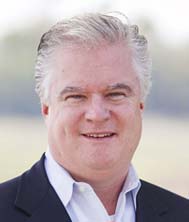
Gerry McDougall
Gerry is a principal in PwC’s Health Sciences Practice serving academic and research organizations across the healthcare continuum. Gerry joined the firm in 1988. He is responsible for leadership of the broad range of basic, translational and clinical research strategic and business planning services that PwC provides to academic and research organizations, specializing in development of synergistic partnerships and creation of new research ventures. Gerry serves as Partner on large engagements involving senior-level clients and interacts with the institution’s Board, financial leaders and political stakeholders. Gerry’s clients have included many of the top 50 Academic Medical Centers, major research universities and health systems, biotech organizations and pharmaceutical/device companies. Gerry leads PwC’s US Oncology Practice serving academic and commercial research organizations across the healthcare continuum and is responsible for leadership of the broad range of basic, translational and clinical research strategic and business planning services that PwC provides to academic and research organizations. He specializes in development of partnerships and creation of new research ventures. Over the last decade of Gerry’s leadership of the Health Sciences practice, clients
have included CEO’s, Presidents, Boards of Directors, prominent scientific leadership including Nobel Laureates, National Academy members, Lasker Award recipients, leaders of patient advocacy groups, heads of R&D, Chief Scientific Officers, CMO’s, the federal government and governors of several states. Over the past 5 years, Gerry’s teams have helped secure billions of dollars for biomedical 24 of 37 research and he has been instrumental in assisting prominent organizations such as the Knight Institute for Early Detection of Cancer and its clinical Director, Dr. Brian Druker, in developing strategies and plans to invest funds for the early detection of cancer. Among many strategic goals, they have focused on several key areas including: identifying the current limits of sensitivity and specificity and determining how they can be markedly improved to advance early detection; drawing clear distinctions between technological limitations and barriers that can be overcome versus absolute physical limits that define the boundaries of what is technically possible; contemplating which technologies are best suited for individual tumors and which could be applied broadly; development of cohorts suited to evaluating novel early detection technologies; the current understanding of the biology of transition from pre-malignancies to lethal malignancies; and what can be learned about early cancer recurrence, its prediction and detection, and how these things may inform earlier detection technologies.
